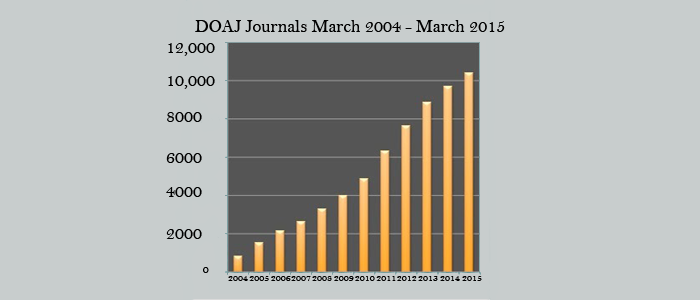
Directory of Open Access Journals removes thousands of journals from its database
The Directory of Open Access Journals (DOAJ), a leading open access journals’ index, has decided to tighten the standards for journals’ acceptance, in order to rule out dubious and inactive publishers.
Functioning on a voluntary basis, DOAJ is a community-curated list of peer-reviewed open access journals. In the past few years, the number of journals indexed at DOAJ grew almost exponentially, (see graph) from the initial 300 journals listed in 2003, to around 11,000 journals in the beginning of 2016.
Escaping predators
However, this growing trend flipped in the last six months, after the removal of around one-third of DOAJ’s indexed journals. The DOAJ started a ‘quality-check’ process in 2014, after facing harsh criticism for listing several predatory publishers– collecting article processing fees (APCs) while offering low quality journals, mostly without undergoing (rigorous) peer review processes.
Every publisher listed at the DOAJ was asked to resubmit their journals’ applications, which were then evaluated on the basis of more strict criteria. Lars Bjørnshauge, DOAJ’s managing director, explained to the Nature journal that publishers who failed to either resubmit or to provide reliable information about their mission, location and operation were excluded from the open access directory. The list of the excluded journals can now be found at the DOAJ’s website.
Open access on the rise
According to DOAJ, the number of open access journals is on the rise; every week, around 80 open access publishers apply for indexation. Yet, a large amount of those publishers fails to meet DOAJ’s quality criteria; only in the last two years, around 5,400 applications were rejected, mainly due to the lack of information regarding licensing rights, publication permission and editorial transparency.
Lars Bjørnshauge recognizes that the major challenge in the current open access landscape is no longer finding new open access publishers, but rather to keep the existing ones under a strict quality control. After excluding 3000 dubious open access journals from its index, DOAJ now plans to hire brand ambassadors to promote good publishing practices and assess new journals’ applications. Nature




